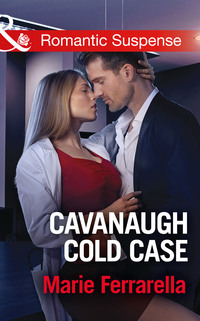Das Buch kann nicht als Datei heruntergeladen werden, kann aber in unserer App oder online auf der Website gelesen werden.
Buch lesen: "Cavanaugh Cold Case"
“You may just have found our first genuine break in this case, Doc,” Malloy declared with enthusiasm.
“You’re welcome,” Kristin murmured as she lowered her eyes back to the partially reconstructed skeleton on the table before her.
Which was why she failed to be prepared for what came next. By the time she realized what was happening, it was too late.
Caught up in the moment, Malloy bracketed her shoulders between his hands and delivered a very enthusiastic and yet innocent kiss to her cheek.
The next second, he had released her and quickly crossed the floor, getting halfway to the door.
“I’ll get back to you,” he promised half a second before he was gone.
Kristin stared at the opened door, stunned. Half of her was hoping that he would live up to his promise—and half of her really hoped that he wouldn’t.
* * *
Be sure to check out the next books in this exciting series: Cavanaugh Justice— Where Aurora’s finest are always in action…
Cavanaugh Cold Case
Marie Ferrarella

USA TODAY bestselling and RITA® Award–winning author MARIE FERRARELLA has written more than two hundred and fifty books for Mills & Boon, some under the name Marie Nicole. Her romances are beloved by fans worldwide. Visit her website, www.marieferrarella.com.
MILLS & BOON
Before you start reading, why not sign up?
Thank you for downloading this Mills & Boon book. If you want to hear about exclusive discounts, special offers and competitions, sign up to our email newsletter today!
Or simply visit
Mills & Boon emails are completely free to receive and you can unsubscribe at any time via the link in any email we send you.
To
Reta Renner
Who Can Pronounce
Cacti and Succulent Names
That Make My Tongue Ache
Contents
Cover
Introduction
Title Page
About the Author
Dedication
Prologue
Chapter 1
Chapter 2
Chapter 3
Chapter 4
Chapter 5
Chapter 6
Chapter 7
Chapter 8
Chapter 9
Chapter 10
Chapter 11
Chapter 12
Chapter 13
Chapter 14
Chapter 15
Chapter 16
Chapter 17
Chapter 18
Chapter 19
Chapter 20
Chapter 21
Chapter 22
Epilogue
Extract
Copyright
Prologue
Josephine Alberghetti placed an overly generous portion of lasagna in front of her daughter, then sighed as she took a seat opposite her.
“Mom, you’ve been sighing like that since I walked in through the door ten minutes ago. What’s up?” Dr. Kristin Alberghetti asked her mother.
Josephine pressed her lips together, as if hesitating to give voice to what was fairly bursting to come out. The next moment, the hesitation was over, just as Kristin knew it would be. Drama and her mother were best friends.
“When you first came to me and told me that you wanted to be a doctor, I was so proud I thought I would just burst,” Josephine told her only child. “I wasn’t sure how we were going to pay for it with your father, God rest his soul, gone, but I remember being so very, very proud—and determined to help you reach your dream. I was willing to work my fingers to the bone, putting in twenty hours a day to make my little girl’s dream come true.”
Kristin knew where this was going. The same place that it had gone before.
“Uncle Gasper lent you the money, Mom,” Kristin reminded her mother patiently. “Actually, he gave you most of it.”
Though her father’s uncle had fought her, Kristin had stubbornly insisted on paying the man back. It hadn’t been easy, but she did it, taking and holding down jobs whenever she could while going to medical school. Through extreme dedication and concentrated energy, at the sacrifice of her social life, she’d managed to graduate ahead of time, thanks to an accelerated program.
But this wasn’t about her mother’s sacrifices—of which she would have been the first to say that there were a legitimate number. This was about something else. And Kristin had a very strong feeling she knew what that “something else” was.
Kristin and her mother were seated at the table in the kitchen where she had spent her first seventeen years. She had only a little time to spare and had actually popped in to visit in the middle of the morning—taking a couple of hours of personal time—because her mother had complained about being neglected. Feeling guilty, Kristin had juggled a few things, put a couple more on hold and then dashed over.
Kristin’s grandmother, Sophia, a fixture in her life for as far back as she could remember, was also there. Kristin exchanged glances with the older woman now. She knew what was coming, as did her grandmother. Out of respect for her mother—because she knew how frustrated Josephine Alberghetti felt—Kristin kept her silence. But it wasn’t easy.
“But why you took all that wonderful knowledge,” Josephine was saying, “and training and practically just threw it out the window to become a medical examiner, poking around inside of dead people, is really, really beyond me.” She looked at her daughter pleadingly. “Can’t you just go into private practice? Think of the good you could be doing.”
“I am doing good, Mom,” Kristin told her mother. This certainly wasn’t the first time they had done this dance, but her mother seemed to refuse to remember her good reasons for choosing this route. She patiently repeated one. “I’m bringing closure to a great many families who need answers.”
In response, Josephine rolled her hazel eyes dramatically. “Closure,” she murmured under her breath as if it was a dirty word.
“Leave the girl alone, Josephine,” Sophia told her daughter sharply. The family matriarch smiled at her granddaughter. “She is happy closing things. It is her life.”
“And she’s wasting it,” Josephine retorted. “How is Kristin supposed to meet anyone when she’s standing in the middle of a morgue, surrounded by dead people, for heaven’s sake?” she demanded.
“Did you not hear her?” Sophia asked, the volume of her voice increasing as she made her point. At nearly eighty, Sophia Moretti’s voice was as strong and loud as when she first arrived in America at the age of twenty-eight. “She is closing things for families. Maybe one of those families has a son—”
Kristin stared at her grandmother, grappling with a sudden feeling of betrayal. No matter what, her grandmother had always been on her side. “You, too, Nonny?”
Sophia leaned over the food-laden kitchen table to pat her granddaughter’s hand. “I am just trying to—how you say?—humor your mama. Marry, don’t marry, it is all the same to me. Just be happy, little one,” she said to her youngest granddaughter. “The family has enough small people already.”
“Easy for you to say,” Josephine pouted, not trying too hard to keep the bitterness out of her voice. “You have lots of grandchildren and great-grandchildren.”
Sophia pursed her lips together. “We are all family, Josephine. We share. You want some grandchildren? I will let you have some of mine.”
“Listen to Nonny,” Kristin coaxed. “We all live in Aurora. You need short people to hug, you can go over to Theresa’s or Lorraine’s or Angela’s,” she said, enumerating her cousins, all of whom were married with at least two, if not more, children, “and hug one of their kids.”
“I love those children,” her mother replied honestly, “but it’s not the same thing, and you know it,” Josephine complained. She looked at her own mother accusingly. “You’re supposed to be on my side.”
Sophia raised coarse hands that had been weathered by decades of hard work and pretended to push back her daughter’s words of rebuke. “I take no sides. I just sit and listen.”
To which Josephine responded with a contemptuous “Ha!”
Any response from Sophia Moretti was interrupted by Kristin’s ringing cell phone.
Josephine sighed deeply as she watched her daughter reach into one of her pockets and take out the offending electronic gadget. To Josephine phones did not belong in pockets, and they certainly didn’t belong at a family meal.
Holding her hand up for momentary silence, Kristin listened to the call. Her boss, Sean Cavanaugh, the chief of the crime scene investigation lab, was on the other end of the line.
“Sorry to interrupt your personal time, Doctor, but I’m afraid we need you at a crime scene,” he told her, his deep voice rumbling in her ear. “We’ve found two bodies so far.”
“So far?” Kristin repeated uncertainly, surprised at the way he’d phrased the news. “Are you expecting to find more?”
“Unfortunately, yes,” she heard him respond wearily. “It looks like there might be quite a few.”
How many were there in “quite a few?” Kristin wondered, a shiver threatening to slide up and down her spine. “That sounds like you’ve hit some kind of mother lode, sir.”
“That’s what I’m afraid of,” he told her. “I’d appreciate it if you got here as soon as you could.”
“Yes, sir. On my way,” Kristin told him quietly.
Sophia lowered her voice as she leaned toward her daughter, taking care not to interfere with her granddaughter’s call. “What means this ‘mother lode’?” she asked.
Josephine sighed as she rose to her feet and began to put away the food she had taken out the minute her daughter had walked through the door. Family mealtimes were treasured, no matter when they took place and how small the family unit at that particular moment might be.
Timing-wise, this had to be a new record.
She transferred Kristin’s serving onto a paper plate, then with a minimum number of movements, efficiently wrapped it all up in aluminum foil. “It means, Ma, that Kristin is leaving.”
Chapter 1
It wasn’t going to be one of his better days.
He could just feel it in his bones.
The road Malloy Cavanaugh was driving on was becoming almost dangerously hypnotic. He’d been on it for close to half an hour.
His eyes felt as if they were burning—always a bad sign—and his eyelids kept threatening to shut on him. Thanks to the rather considerable charms of a young woman he’d met the other night with the not totally inaccurate nickname of Bunny, he had gotten very little sleep the past two nights.
Hence, Detective Malloy Cavanaugh of the department’s Cold Case Division was not his usual energized self this morning.
Catching up on a backlog of paperwork would have been far more to his liking at this point. At least, if he fell asleep at his desk, there was no danger of driving that desk into a ditch or off the side of the inclined road the way there was at the moment.
Aurora, California, where he had moved several years ago with the rest of his family, was a work in progress, a city whose council worked hand in hand with its developers. Consequently—and aesthetically—that development progressed slowly.
What that ultimately meant was, according to his uncles, Aurora had taken thirty-five years to go from a rural, two-lane, three-traffic-light town to the major thriving city it was today.
That also meant that there were still large parcels of land that were generally undeveloped. Most of them were located on the outskirts of the southern perimeter of Aurora.
That was where he was traveling right now, on his way to a crime scene, which, it seemed, had the dubious distinction of being both the site of a multiple homicide and the site of a cold case all at the same time.
The bodies, according to the investigators who had been summoned by the first officer on the scene, had apparently been in the ground for years; the exact amount of time—as well as the exact number of bodies—had yet to be determined.
Hell of a way to start a Monday morning, Malloy thought, stifling a yawn before it managed to momentarily make him shut his eyes.
He took in a deep breath, trying hard to rouse himself. A better way to go would have been to drink some of the pitch-black, strong coffee that was riding next to him in his vehicle’s cup holder, but unless he pulled over—something, considering the narrowness of the winding road he was on, that was not advisable—he was not about to risk reaching for the tall container.
For that to happen, the split second that his eyes might be off the road could just be enough to send him careening into an accident—or his demise.
Notoriously happy-go-lucky and possessed of what some had referred to as a charmed life, Malloy was still not reckless enough to think himself above any and all accidents. Better safe than sorry had been an unspoken mantra in his family, courtesy of his very wise, late mother.
All things considered, he chose to obey that mantra this morning.
The coffee could wait.
Instead, Malloy did his best to snap his countenance into alert wakefulness by biting down hard on the inside of his bottom lip. He stopped just short of drawing blood.
Just where the hell was this damn stupid nursery he was going to anyway, he wondered grudgingly. Shouldn’t he have arrived there by now?
According to the information he had been given just before he’d left the precinct, the bodies had been discovered by the owner of a construction crew while clearing some heretofore unused land that belonged to the nursery. The idea was to extend the nursery and erect several more large greenhouses across the two additional acres.
The greenhouses were to display even more specimens of cacti and succulents, as if four acres weren’t already enough, Malloy thought darkly.
At the age of eight, after running through what he thought was an empty field at twilight, he’d tripped and gotten almost impaled on the sharp, near-lethal spines of a small, but menacing saguaro cactus. Since then Malloy had developed an aversion for everything and anything that even remotely looked as if it belonged to the cacti family.
To his mind, it only seemed natural that an aversion to succulents should follow, as well. Though a collector would argue the point, it seemed like one and the same to him.
He was vaguely aware that there were whole clubs devoted to meeting regularly and discussing the care and feeding of various different species of these visually ugly plants, but for the life of him, he could not fathom why.
Then again, he didn’t understand why anyone would pay more than the cover price of a so-called rare comic book, either.
It took all kinds, Malloy told himself.
Taking a turn down yet another obscure road whose sign he had almost missed, Malloy breathed a sigh of relief. Apparently, he was almost at journey’s end. There was a sign posted up ahead just before a newly installed chain-link fence.
The sign proclaimed Rainbow Gardens. The sign looked new, as well.
According to what he’d been told, the old nursery, which had gone by—to his way of thinking—the far more accurate name of Prickly Gardens, had been sold a little over a month ago. The present owner had come in with new ideas, the first of which had included expansion of the nursery so that even more plants could be properly showcased.
Sorry, no expanding yet, Malloy thought. There’s the little matter of some bodies to clear up.
Malloy pulled his car right up to the gate. The latter was closed.
There was another sign, an older, weather-beaten one, which told whatever traveler approached it that visitors were admitted “By appointment only.” It went on to say that if the visitor did have an appointment, to “Please, honk.”
There was what appeared to be a trailer standing some distance away, perched just above a row of several small greenhouses. Surrounding those greenhouses were a great many succulents and cacti planted in the ground and growing at a very prodigious rate.
Malloy assumed that honking was for the benefit of whoever was inside the trailer.
With his engine running as his car stood before the gate’s fence, Malloy paused to drain half the coffee in the container he’d brought. Only then did he do as the sign advised.
He honked his car’s horn.
When there was no immediate response, Malloy did it again, this time leaning on his horn until he saw movement from the trailer.
A man wearing gray dress slacks and a crisp, long-sleeved, button-down blue shirt approached the gates. He appeared totally out of place in the rural-looking, overgrown nursery.
He also looked extremely agitated.
Unlocking the gate, the man greeted Malloy by announcing, “Finally!” as he pulled the gate back.
Malloy drove down the slope and into the nursery, pulling his vehicle over to the first available parking area. The entire space was meant, he assumed, to accommodate several vehicles, but it looked barely wide enough to house three very compact cars. Planning was obviously not someone’s strong suit.
Deliberately taking his time—he didn’t care for the man’s attitude—Malloy stepped out of his car almost in slow motion, his shoes carefully making contact with the sun-cracked dirt as if he could feel the heat through the bottom.
Looking at the man who made no secret of sizing him up, Malloy said, “Excuse me?”
“I said, ‘finally,’” the man bit off sharply. “Maybe now that you’re here, you can move this so-called ‘investigation’ to its conclusion.” It wasn’t a question but a strongly worded order. Angry, the man contemptuously indicated the four idle fellows standing in the distance. “That construction crew is being paid by the hour to stand around and watch that woman bend over.”
Okay, maybe he’d had less than the minimum hours of sleep to be sufficiently operational, Malloy thought, but he had just had a really good jolt to his system, thanks to the coffee he’d imbibed a minute ago, and the scowling man in front of him still wasn’t making any sense.
“You want to run that by me again?” Malloy requested. “Starting with your name.”
“I’m Roy Harrison,” the guy grudgingly bit off. “And I just had my lawyer buy this property for me.”
There was practically steam coming out of Harrison’s rather large ears. In his position, Malloy supposed he wouldn’t exactly be thrilled, either.
“I take it congratulations are not in order,” he commented.
“Damn straight they’re not,” Harrison snapped. “I paid for a cacti and succulent nursery, lock, stock and barrel. I didn’t pay for some freaking boneyard,” he bit off in complete disgust. “Can’t you and that dour-faced former cheerleader take these damn bones and do whatever it is you have to do with them somewhere else? I’ve got a nursery to get ready to open,” the man complained unnecessarily.
“I’m afraid nothing’s happening on that end until all the evidence is bagged and tagged, and we can determine whether or not this was the actual scene of the crime—or if the victims were killed somewhere else.”
Though he kept his expression deliberately neutral, Malloy had to admit that he rather enjoyed putting a pin in the man’s balloon. He’d never cared for people who were filled with their own sense of importance—especially if they felt that gave them a reason to throw their weight around.
His answer did not sit well with the new nursery owner. Harrison’s scowl became almost fierce as he waved a hand angrily in Sean Cavanaugh’s general direction. The latter was standing in the distance, working alongside his team.
“I overheard that old guy say that these bones have been in the ground for maybe two decades. What the hell difference can it make now where you look at them?” Harrison demanded. “They’re old.”
“It makes a great deal of difference,” Malloy told the new owner, his voice deceptively calm. “And that ‘old guy’ you just referred to happens to be the head of the crime scene investigation lab—and my uncle,” he added crisply. “So maybe you could find it in your heart to show a little respect for the man and his considerable knowledge. Who knows?” Malloy added “pleasantly,” his obvious contempt for the owner beginning to show through. “You play your cards right and the chief actually might find a way to shorten the time.”
Harrison already looked infuriated to find himself stymied in this manner, not to mention that he highly resented being rebuked by someone he obviously felt was beneath him.
The next moment, Harrison took out his wallet, his implication clear as he tugged on a larger bill, having it peer over the top of his credit cards. “What can I do to make this go faster?”
“Not bribing me would be a good start.” Malloy flashed a completely phony smile at the offensive nursery owner. “Hang tight, Harrison. I’m going to have some questions to ask you in a few minutes.” But before that happened, he needed to check in with the CSI team first. “Now, about that ‘former cheerleader’ you mentioned—”
A barely veiled sneer curved Harrison’s thin lips. “Let me guess, another relative?”
Malloy had just spotted the woman the new owner had to be referring to. She was the only female in the area, and, from what he could see at this distance, whoever she was, the slender blonde was nothing short of a breathtaking knockout.
All memory of Bunny, the woman he’d spent his extremely energized weekend with, completely vanished.
“Lord, I hope not,” Malloy commented under his breath. “I’ll get back to you,” he added without sparing the owner another look.
“Who can I call to make this go away?” Harrison asked.
“You don’t,” Malloy answered with finality, tossing the words over his shoulder.
Putting the abrasive owner temporarily out of his thoughts, Malloy made his way toward what was the only center of activity within the area—if he didn’t count a neighbor’s rooster.
The lone fowl was housed in an opened coop facing the northern perimeter.
Flapping his wings and moving about in what could only be called an agitated manner, the rooster crowed intermittently despite the fact that the sun had long since been up and the current hour was quickly approaching noon.
Obviously the rooster’s inner clock needed some adjusting, Malloy absently thought.
For the moment, his attention was not on roosters, or the dead bodies. It was strictly and exclusively on the attractive woman with the killer figure. Despite her appreciative male audience standing a few feet away, watching her every move, the woman appeared to be absorbed by the bones she and two of the CSI agents were digging up out of the ground and arranging on a long, extended roll of burlap.
The annoying owner had been right, Malloy noted, scanning the immediate area. The construction crew Harrison had hired really were, for all intents and purposes, immobilized, no doubt ordered to remain that way by his uncle.
But the crew definitely didn’t appear to be suffering any discomfort because of that edict.
Instead, the idle four men looked to be quite entertained as they took in every nuance, every movement made by the young woman studying the various excavated bones.
Malloy approached the young woman and placed himself between her and the sunlight that had, until that moment, been highlighting the collection of bones she had been assembling.
“Hi, I’m Malloy,” he told her.
The voice and sudden distracting shift of light caught her attention. After a couple beats, Kristin finally looked up.
If the exceedingly handsome, exceptionally confident-looking man with the sexy grin momentarily threw her off her game, Kristin Alberghetti gave no indication of that reaction.
Instead, her eyes met his, and she silently waited for him to explain why he was here blocking her light.
The name he offered nudged at something in the back of her mind. After a moment, recognition set in.
Malloy Cavanaugh. One of the Cavanaughs.
His reputation had preceded him.
“Of course you are,” she replied, turning her attention back to her work.
“And you are?” he asked after several seconds went by and she still didn’t volunteer her name, even though he had given her his.
“Busy,” Kristin answered crisply without looking up. “And you’re in my light,” she added rather impatiently.
“Funny, I would have thought that you cast enough light on your own to brighten up anything you needed to look at,” Malloy observed.
The blonde looked up again, her expression telling him that the remark—and his charm—left her more than just merely cold.
“Sorry, no,” she replied. Ice chips formed around each word. “Would you mind stepping to the side? I got the impression that the owner of this nursery wanted me to be done before I even got here, so if you move out of the light, I can try to accommodate him.”
“Sorry,” Malloy apologized, following her request. “My bad.”
“I imagine you probably say that a lot,” Kristin commented, sounding as if she were addressing the observation to herself instead of to him.
Feisty, Malloy thought. Ordinarily, he probably would have backed away. This was, after all, a case, and he wasn’t the type to waste too much time trying to break through a woman’s barriers. For one thing, life was too short. For another, he was being paid to be a detective, not a lover. And there were a great many willing women out there to choose from.
But, on the other hand, there was a certain appeal to the concept of “feisty,” especially when it was coupled with someone who looked the way this woman did.
Exactly who was she?
What was her official position in the department, and how did he get her to open up to him?
“You’re new,” he said, hoping to initiate a conversation.
Kristin spared him just the minutest of glances before she went back to her work. “Actually, I’m not,” she told him.
“I haven’t seen you around,” he told her. “And I always notice beautiful women.”
“Well, I guess you missed one this time,” she responded, carefully separating two bones that looked as if they had been fused together by grit and time.
Rather than annoying him, the flippant way she’d answered what was clearly a line—he hadn’t been trying to be subtle—seemed to oddly attract him to an even greater extent.
Crouching down beside the woman, he said, “Let’s start over.”
The look she gave him would have withered a lesser man.
“Maybe later. I’m working now.” Her expression turned impatient. “And you’re in my light again.”
“Right.”
To accommodate her, Malloy rose to his feet, taking care to allow the sunlight to stream over and bathe the bones laid out before her.
This one, he told himself, was going to be a tough nut to crack.
And he couldn’t wait to get started.
Die kostenlose Leseprobe ist beendet.








